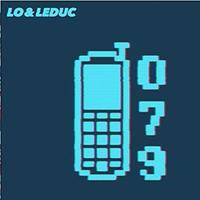079 by Lo & Leduc
Gäb sie mir wenigschtens d Vorwau (Wenn sie mir wenigstens die Vorwahl geben würde)
Per favore (Bitte)
Nja, ey (Naja, hey)
Per favore (Bitte)
Ohh, gäb sie mir wenigschtens d Vorwau (Ohh, wenn sie mir wenigstens die Vorwahl geben würde)
Per favore (Bitte)
De gäbs nume no 10 Millione Kombinatione, ja (Dann gäbe es nur noch 10 Millionen Kombinationen, ja)
«0-7-9» het sie gseit ("0-7-9", hat sie gesagt) «Du weisch immer no nüt», het sie gseit ("Du weißt immer noch nichts", hat sie gesagt) Nidmau tschüss het sie gseit, ey (Nicht einmal Tschüss hat sie gesagt, hey)
Und i frage sie ob ig ihri – tüt tüt tüt het sie gseit tüt tüt (Und ich frage sie ob ich ihre…- „Tüt tüt tüt“, hat sie gesagt - tüt tüt)
«0-7-9» het sie gseit ("0-7-9", hat sie gesagt) «Du weisch immer no nüt», het sie gseit ("Du weißt immer noch nichts“, hat sie gesagt) Nidmau tschüss het sie gseit, ey (Nicht einmal Tschüss hat sie gesagt, hey)
Und i frage sie ob ig ihri – tüt tüt tüt het sie gseit (Und ich frage sie ob ich ihre…- „Tüt tüt tüt“, hat sie gesagt - tüt tüt)
Yeah (Ja)
I lüte jede Tag ar Uskunft aa (Ich rufe jeden Tag die Auskunft an)
U möcht ihri Nummer ha (Und möchte ihre Nummer haben)
Wär lütet hüt no dr Uskunft aa? (Wer ruft heute noch die Auskunft an?)
Viu schaffe nümme da (Viele arbeiten dort nicht mehr)
Nume no sie u no zwöi angri (Nur noch sie und noch zwei andere)
Heisst, jedes dritte Mau isch sie dran (Das heißt, jedes dritte Mal ist sie in der Leitung)
Sie gäb mir jedi Nummere, Nummere (Sie gibt mir jede Nummer, Nummer)
Nume ihri git sie mir nid (Nur ihre, die gibt sie mir nicht)
Gäb sie mir wenigschtens d Vorwau (Wenn sie mir wenigstens die Vorwahl geben würde)
Per favore (Bitte)
De gäbs nume no 10 Millione Kombinatione, ja (Dann gäbe es nur noch 10 Millionen Kombinationen, ja)
U wen i nächär pro Minute drü vo de Nummere usprobier (Und wenn ich nachher pro Minute drei von den Nummern ausprobiere)
De chönns maximau nume sächsehaub Jahr lang ga bis i ihri fing (Dann kann es maximal noch sechseinhalb Jahre dauern bis ich die ihre finde)
«0-7-9» het sie gseit ("0-7-9", hat sie gesagt) «Du weisch immer no nüt», het sie gseit (Du weißt immer noch nichts", hat sie gesagt) Nidmau tschüss het sie gseit, ey (Nicht einmal Tschüss hat sie gesagt, hey)
Und i frage si ob ig ihri – tüt tüt tüt het sie gseit tüt tüt (Und ich frage sie ob ich ihre…- „Tüt tüt tüt“, hat sie gesagt - tüt tüt)
«0-7-9» het sie gseit ("0-7-9", hat sie gesagt) «Du weisch immer no nüt», het sie gseit (Du weißt immer noch nichts“, hat sie gesagt)
Nidmau tschüss het sie gseit, ey (Nicht einmal Tschüss hat sie gesagt, hey)
Und i frage sie ob ig ihri – tüt tüt tüt het sie gseit tüt tüt (Und ich frage sie ob ich ihre…- „Tüt tüt tüt“, hat sie gesagt - tüt tüt)
Und jitz bin i sit Jahre (Und jetzt bin ich seit Jahren)
Immer falsch verbunde (Immer falsch verbunden)
Und am Schluss bliebt mir tatsächlich nume ne Nummre, nume no ei Nummre (Und am Schluss bleibt mir tatsächlich nur noch eine Nummer, nur noch eine Nummer)
U won i die tipp, mit zittrige Finger (Und wie ich diese mit zittrigen Fingern eintippe)
Und i mir sicher bi, dass die doch muess stimme (Und ich mir sicher bin, dass diese doch stimmen muss)
Ghöri plötzlech das öbber drann isch (Höre ich plötzlich, dass jemand dran ist)
U wäge däm ghör i das Tram nid (Und deswegen höre ich die Straßenbahn nicht)
Wo no het wöue brämsen, aber es längt lang nid (Welche noch versucht hat zu bremsen, aber das hätte nie und nimmer mehr gereicht)
Es renne Lüüt zare u aus verlangsamt sich (Es rennen Leute her und alles verlangsamt sich)
«1-4-4» hen sie gseit ("1-4-4“, haben sie gesagt) «Wie isch das nume passiert?», hen sie gseit ("Wie ist das nur passiert? ", haben sie gesagt) «Huere Siech», hen sie gseit, ja (Verdammte Scheiße", haben sie gesagt, ja) U sie winke d Ambulanz häre, «Hier, hier, hier» hen sie gseit «hier, hier» (Und sie winken den Krankenwagen her, "Hier, hier, hier", haben sie gesagt "hier, hier") «1-4-4» hen sie gseit ("1-4-4", haben sie gesagt) «Wie isch das nume passiert?», hen sie gseit (Wie ist das nur passiert? ", haben sie gesagt) «Huere Siech», hen sie gseit, ja (Verdammte Scheiße", haben sie gesagt, ja) U sie winke d Ambulanz häre, «Hier, hier, hier» hen sie gseit «hier, hier». (Und sie winken den Krankenwagen her, "Hier, hier, hier", haben sie gesagt "hier, hier")

